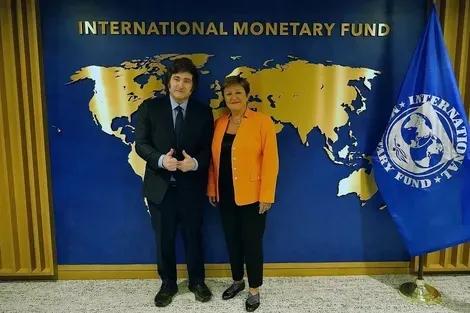Javier Milei with Kristalina Georgieva from the IMF.
What is known about the agreement
Despite the triumphant announcement of victory, few details are known about the agreement. There has been no discussion of amounts, nor the type of agreement: Stand-by, also known as ABS, or SAF. Both subject to the fulfillment of previously agreed objectives, the difference between them lies in the timeframe and the radicality of the changes required by the fund. While the former is a shorter-term agreement, the latter is long-term and responds to countries with structural macroeconomic problems, often requiring more drastic policy changes.

Screenshot of the post by the presidential spokesperson, Manuel Adorni, hours before the official announcement.
Still unaware of the details, what is known is the objective of the agreement. In the words of the official statement, "This agreement will strengthen the balance of the Central Bank, an essential milestone to consolidate monetary, financial, and macroeconomic stability and continue with the process of disinflation and the lifting of exchange restrictions." This aligns with the Government's conviction: fiscal balance is non-negotiable.
Need and Urgency?
In sectors of public opinion, the decision not to send the corresponding law to Congress before signing the agreement, opting instead for a Decree of Necessity and Urgency, has caused a stir.
How DNUs are expected to function
First of all, in 2021, the popularly known "Guzmán Law" was enacted, which stipulates that any financing program or agreement with the IMF must first go through Congress. In previous instances, such as in 2018, the controversy would not have existed because there would have been no need to send the bill.
Now, in our National Constitution, article 99 inc 3 states concerning the Executive Power:
Only when exceptional circumstances make it impossible to follow the ordinary procedures provided by this Constitution for the sanction of laws, and it does not concern norms regulating criminal, tax, electoral matters or the regime of political parties, may it enact decrees for reasons of necessity and urgency, which will be decided in a general agreement of ministers who must endorse them, together with the chief of the cabinet of ministers.
Furthermore, the law regulating this article -also highly controversial- was enacted in 2006. The procedure requires that, at the appropriate time, both chambers of Congress must evaluate the formal issues (i.e., that they comply with the cited paragraph above), not the content of the decree. The DNU remains in force unless both chambers expressly reject it. In other words, to pass a law, approval from both chambers is needed, but for a DNU, only the approval of one chamber is sufficient. The incentives are set to legislate by DNU.
What the government said
In an interview with La Nación+, Luis "Toto" Caputo, Minister of Economy, assured that “If anything can be justified as a matter of necessity and urgency, it is this,” referring to the critical economic situation that the country has faced for years and which is now showing signs of recovery. The goal would be to turn the fight against inflation into a state policy.

Post from X by Lucas Llach, vice president of the BCRA during the government of Mauricio Macri
Is the economic emergency enough to declare Necessity and Urgency?
According to Supreme Court jurisprudence, no. The decree was announced after ordinary sessions had begun, meaning there would be nothing preventing the ordinary processing of a bill, in principle.
In conclusion, the controversy regarding the validity of the DNU is more complex than it seems a priori. Is the "Guzmán Law" necessary? If so, is the reduction of inflation a sufficient cause to declare necessity and urgency? This is not the first time that governments legislate by DNU, a practice that has intensified since the law regulating the 1994 Constitution. For the IMF, the approval of the DNU is a sign of commitment to the program, improving the negotiation conditions for the country.

Comments